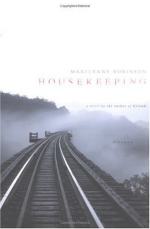|
This section contains 4,171 words (approx. 14 pages at 300 words per page) |

|
SOURCE: Burke, William M. “Border Crossings in Marilynne Robinson's Housekeeping.” Modern Fiction Studies 37, no. 4 (winter 1991): 716-24.
In the following essay, Burke contends that Housekeeping may be interpreted as “an unconventional primer on the mystical life,” wherein transience serves as the primary metaphor and Ruth's spiritual preparation is portrayed by the expansion of her consciousness through a series of “social, geographic, and perceptional” border crossings.
Marilynne Robinson's novel Housekeeping has been drawing the kind of acclaim that may establish it as an American classic.1 Most of the praise for the novel focuses on the masterly display of language, but some of it falls particularly on its reputation as a woman's novel, a rare book that touches some central female experience. Aviva Weintraub calls Housekeeping an “essentially female novel” and the lake that dominates the landscape “an essentially female image” (69). Joan Kirkby sees the novel as a rejection of “the...
|
This section contains 4,171 words (approx. 14 pages at 300 words per page) |

|


